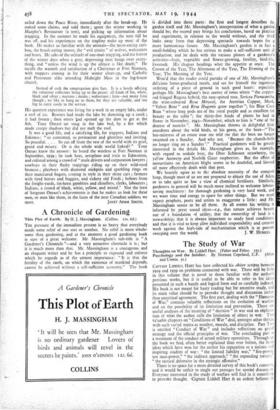A Chronicle of Gardening
This Plot of Earth. By H. J. Massingham. (Collins. 125. 6d.) THE pressure of the immediate present is so heavy that everybody needs some relief of one sort or another. No relief is more whole- some than gardening, and at the moment a good gardening book is sure of a great welcome. Mr. Massingham's sub-title is " A Gardener's Chronicle "—and a very attractive chronicle it is ; but it is much more than that. Mr. Massingham is a courageous and an eloquent writer and he has a principle to expound and enforce which he regards as of the utmost importance : " It is that the fertility of the earth, on which the existence of mankind depends, cannot be achieved without a self-sufficient economy." The book is divided into three Parts : the first and longest describes tht garden itself and Mr. Massingham's interpretation of what a garden should be; the second part brings his conclusions, based on practice and experiment, in relation to the world without, and the third looks away from that depressing spectacle towards hopes for a more harmonious future. Mr. Massingham's garden is in fact small-holding which he has striven to make a self-sufficient unit of production, and he deals with the various phases of a gardener's activities—fruit, vegetable and flower-growing, fertility, bird-life, livestock. His 'chapter headings whet the appetite at once. The Crown of the Year, The Afternoon of the Year, The Evening of the Year, The Morning of the Year.
Vliou'.c1 that the reader could partake of one of Mr. Massingham's delicious home-produced meals, and see for himself the ingenious ordering of a piece of ground in such good heart: especially perhaps Mr. Massingham's best corner of roses where " the copper- red fringed Rugosa hybrid, the rosy-spined rose, Sericea Pteracantha, the wine-coloured Rosa Moyesii, the Austrian Copper, Musk, " Velvet Rose " and Rosa Hugonis grow together "; his Blue Coco Bean " whose long pods are of the royal purple and as excellent for beauty as the table "; the thirty-five kinds of plants he had in flower in November, 1943—November, which to him is "one of the dearest of months ". Mr. Massingham throws in delightful little anecdotes about the wild birds, or his geese,. or the bees—" The bee-mistress of an estate near me told me that the bees no longer swarmed on a Sunday. And why not. Because the church-bells no longer ring on a Sunday '." Practical gardeners will be greatly interested in the details Mr. Massingham gives as, for example, with regard to seakale beet, the Ober Schlessen strawberry, the yel'ow Antwerp and Norfolk Giant raspberries. But the effect of nasturtiums on American blight seems to be doubtful, and linseed oil more effectively deals with that pest. We heartily agree as to the absolute necessity of the compost heap, though most of us are not prepared to abjure the use of Adco, or to take quite so low a view of chemical fertilisers. Similarly, gardeners in general will be much more inclined to welcome labour- saving machinery : for thorough gardening is very hard work, and we want time and energy to spare for other things. But we must expect prophets, poets and artists to exaggerate a little: and Mr. Massingham seems to be all three. 'At all events his writing is informed by great sound ideas—e.g., that nature achieves beauty out of a foundation of utility; that the ownership of land is a stewardship; that it is always important to study local conditions; and that it is vital to keep alive individual responsibility and creative work against the high-tide of mechanisation which is at present


























 Previous page
Previous page